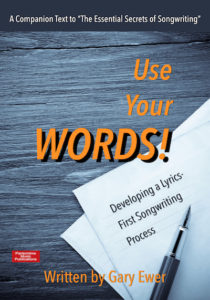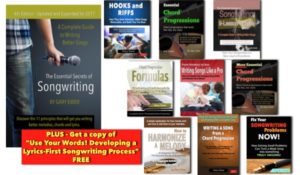Improvisation plays an important role in pop songwriting. And we love that feeling of quickly coming up with musical ideas and having them sound great right from the start.
Hopefully you know, however, that most songs, even the ones that seem to spill deliciously out of our musical minds within minutes, require some working and reworking in order to get them sounding good.
 Trying to get a handle on writing song lyrics? Discover the benefits of making a lyrics-first method your new go-to process with”Use Your Words! Developing a Lyrics-First Songwriting Process. It’s FREE right now when you purchase the 10-eBook Bundle.
Trying to get a handle on writing song lyrics? Discover the benefits of making a lyrics-first method your new go-to process with”Use Your Words! Developing a Lyrics-First Songwriting Process. It’s FREE right now when you purchase the 10-eBook Bundle.
And it’s certainly true with writing lyrics. More often than not, you’ll come up with a phrase that sounds really great, and then you spend a considerable amount of time finding other phrases to connect with it. That’s a normal circumstance in songwriting. Not to sound overly cheeky about it: it’s called work.
And hopefully that’s a fun kind of work.
That process of pulling bits of lyric together into something more complete can take a certain amount of time. So here’s a set of steps that can help reduce the amount of time you spend trying to complete a lyric.
- Write your song’s topic at the top of a page. At this point, you might only have a category in mind (“World Peace”, “Love Song”, etc.), or maybe that one catchy fragment that you want to expand on.
- Write down any and all words and phrases that pertain to your topic. Don’t worry too much about organization at this point. And include words even if you don’t know how or why you even thought of them. Think of this as a kind of stream-of-consciousness kind of exercise. You just want to create a vocabulary from which you’ll build your lyric. And the more, the merrier.
- Circle all the words and phrases that seem to be emotional, or relate to an emotional reaction. These would be words and combinations of words like “You inspire me”, “I love you!”, “hold me up”, and so on. If your song is about some aspect of world peace, the words and phrases you don’t circle might be ones like “bird of paradise”, “sky so blue”, “hope”, “friendly stranger”, etc.
- On a new page, create two lists. The first list will include all the words and phrases you didn’t circle. These are going to be the ones that will serve well as parts of a verse lyric. The second list — the words that you circled in the previous step — will be the ones that will be more emotional in nature, and will work well in a chorus.
From there, you can proceed however you wish. The benefit to having done those 4 steps is that you’ve now got a working vocabulary for your song. And most importantly, you’ve got a good idea where in the song they belong.
And having those lists offers many benefits. It reduces the time you spend on trying to pull words together, as you’ve done much of that work already, so you can stay in a working flow. It also means that you’ll rely less on cliches and other overused expressions, because you’ll have so many other good alternatives.
One final bit of advice: even with songs for which a more or less complete lyric comes to you easily, you might still try this exercise, even if you don’t wind up using those words in your lists. Once you’ve done the exercise, you may find a certain word or phrase that you hadn’t thought of before, one that will help you in the editing phase.
 Written by Gary Ewer. Follow Gary on Twitter.
Written by Gary Ewer. Follow Gary on Twitter.
 “The Essential Secrets of Songwriting” 10-eBook bundle includes several chord progression eBooks, including “Chord Progression Formulas”. Learn how to create chord progressions within seconds using these formulas.
“The Essential Secrets of Songwriting” 10-eBook bundle includes several chord progression eBooks, including “Chord Progression Formulas”. Learn how to create chord progressions within seconds using these formulas.










